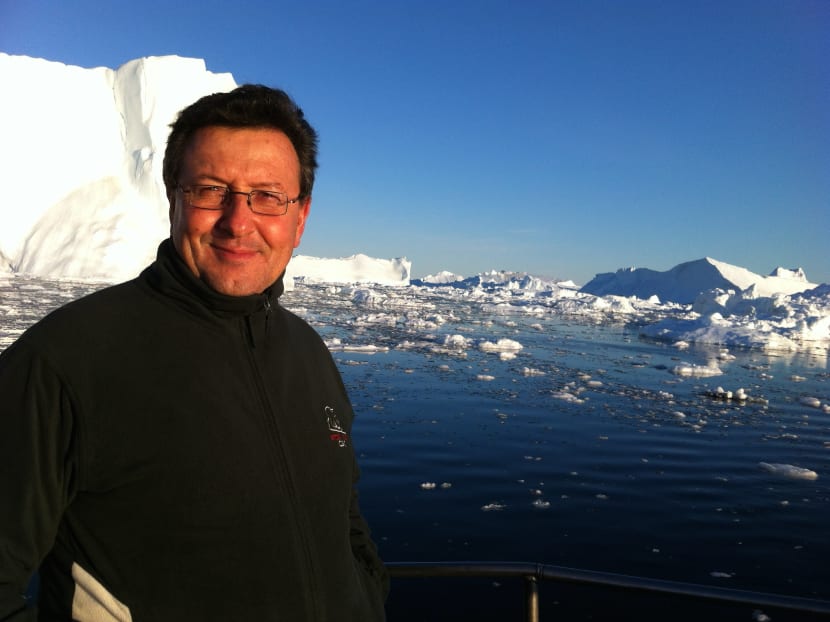Humanity’s role as environmental custodian offers hope amid Covid-19 gloom, says marine scientist
SINGAPORE — The Covid-19 pandemic may have taken a heavy toll on human life and economic activity, but some effects of the reduced human activity offer hope that humanity can improve the natural environment, said a marine ecologist.

Professor Carlos Duarte pictured in Greenland in 2014. He told a Singapore webinar on Nov 5, 2020 that Covid-19 lockdowns around the globe had some upside.
- Dr Carlos Duarte said humanity’s role as environmental custodians is not as well appreciated as the harm humans cause
- He added that the large reduction in greenhouse gases due to Covid-19 imposed lockdowns is not sufficient to slow global warming
- However, he said Southeast Asia has many opportunities to implement nature-based solutions to mitigate climate change
- Mr Joseph Teo said Singapore can be a laboratory for urban solutions, as well as a hub for green financing
SINGAPORE — The Covid-19 pandemic may have taken a heavy toll on human life and economic activity, but some effects of the reduced human activity offer hope that humanity can improve the natural environment, said a marine ecologist.
Dr Carlos Duarte, a professor of marine science at Saudi Arabia’s King Abdullah University of Science and Technology, also said that Singapore has the opportunity to lead global efforts in a green recovery.
Speaking at a virtual conference held by the Singapore Institute of International Affairs on Thursday (Nov 5), Dr Duarte related details of a study he is part of that has been assessing the impact of humans on a range of ecosystems.
CUSTODIANS OF THE ENVIRONMENT
He said that by April this year, around 60 per cent of the global population — or about 5.4 billion people — was under some form of lockdown to prevent the spread of the coronavirus.
“We rapidly saw responses on the environment,” said Dr Duarte, highlighting various accounts of animals re-emerging in places rarely seen in years, as well as reports on unprecedented improvements in air quality due to the decline in greenhouse gas emissions.
However, he pointed out to attendees of a panel discussion at the EU-Singapore Dialogue on Climate Change, titled "Accelerating Climate Action Post-Covid-19: Shared Concerns and Opportunities”, that some research has also identified a downside to the cessation of human activities.
For instance, he said with workers such as wildlife park rangers and the like in lockdown, there is no one to stop poaching or illegal fishing in national parks and protected areas.
He added that the economic impact of Covid-19 has led to the removal of income and funding to conduct conservation activities in the environment, such as restoration projects or environmental monitoring.
“Our role as custodians of the environment is not as appreciated as (compared to the) role of humans as sources of being bad,” he said.
One positive development, he said, is that people online are increasingly talking about the environment and their appreciation for the outdoors during the course of their confinement.
That said, a huge challenge remains in addressing climate change, said Dr Duarte.
He said that despite the large reduction in greenhouse gas emissions caused by the lockdown, it will translate to an avoidance of only a 0.01°C increase in global warming by 2035.
Climate scientists have previously warned that the world has until 2030 for the increase in average global temperatures to be kept to a maximum of 1.5°C above pre-industrial levels, beyond which even half a degree will significantly worsen the risk of drought, floods, extreme heat and sea-level rise.
“It’s absolutely a minuscule impact on climate change trajectories. So that really shows the magnitude of the problem,” he said.
SOUTHEAST ASIA AND NATURE BASED SOLUTIONS
The upside, said Dr Duarte, is that there are many opportunities for Southeast Asia to provide nature-based solutions to mitigate climate change.
For example, he said Singapore, Malaysia and Indonesia should look to restore their tropical rainforests, as they have been shown to have strong potential to contribute to climate change mitigation.
So, too, would the preservation of the region’s mangrove forests and seagrass meadows.
The professor said these areas serve not only as critical habitats for biodiversity, but are very important carbon sinks. In other words, they help to absorb carbon dioxide, a form of greenhouse gas, in the atmosphere.
SINGAPORE, THE URBAN LAB
During the hour-long discussion, which also covered green financing, Dr Duarte and other speakers agreed that Singapore has a part to play in facilitating a sustainable recovery.
Mr Joseph Teo, the chief negotiator for climate change at the Ministry of Sustainability and Environment’s Climate Change Negotiation Office, described Singapore as a laboratory for urban solutions.
For example, he pointed to the country’s ongoing projects to ramp up solar power deployment to achieve at least 2 gigawatt-peak of solar energy by 2030, as well integrating waste and water management, through the Tuas Nexus treatment plant, to reap higher energy efficiency standards.
“If we can do these things well in this small city-state, we can then replicate these solutions in the region and elsewhere,” said Mr Teo.
He added that the Monetary Authority of Singapore is also trying to develop the country into a regional hub for green financing, and this will allow banks to ensure that funds only flow into environmentally sustainable projects.
However, Mr Pascal Lambert, the group country head of Singapore and Southeast Asia for the financial services company Societe Generale, said developing the capacity for sustainable loans will be challenging as such loans cannot be simply classified as bonds.
Still, he said there is potential to benefit from the economic ecosystem in Singapore.
Speaking of the challenges the world is facing, Mr Teo said: “We have the Covid-19 (pandemic), we have a recession looming behind. But we must not also forget climate change.”











